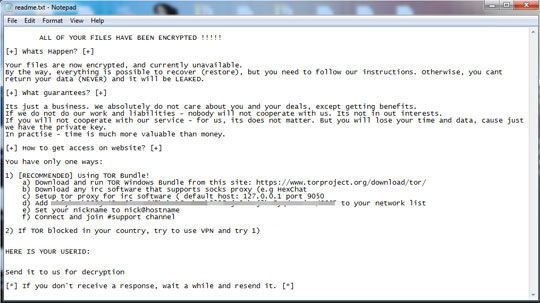Ransom.Win64.DECAF.YXBKO
Windows


Threat Type: Ransomware
Destructiveness: No
Encrypted: No
In the wild: Yes
OVERVIEW
This Ransomware arrives on a system as a file dropped by other malware or as a file downloaded unknowingly by users when visiting malicious sites.
It encrypts files with specific file extensions. It drops files as ransom note.
TECHNICAL DETAILS
Arrival Details
This Ransomware arrives on a system as a file dropped by other malware or as a file downloaded unknowingly by users when visiting malicious sites.
Installation
This Ransomware adds the following processes:
- %System%\cipher.exe /w {Drive Letter} → removes deleted files permanently
- net stop {service name}
(Note: %System% is the Windows system folder, where it usually is C:\Windows\System32 on all Windows operating system versions.)
Process Termination
This Ransomware terminates the following services if found on the affected system:
- Appinfo
- AppMgmt
- AudioEndpointBuilder
- AudioSrv
- BFE
- BITS
- Browser
- COMSysApp
- CryptSvc
- CscService
- DcomLaunch
- Dhcp
- Dnscache
- DPS
- eventlog
- EventSystem
- fdPHost
- FDResPub
- FontCache
- gpsvc
- HomeGroupProvider
- IKEEXT
- iphlpsvc
- LanmanServer
- LanmanWorkstation
- lmhosts
- MMCSS
- MpsSvc
- MSDTC
- Netman
- netprofm
- NlaSvc
- nsi
- PcaSvc
- PlugPlay
- PolicyAgent
- Power
- ProfSvc
- RpcEptMapper
- RpcSs
- SamSs
- Schedule
- SENS
- ShellHWDetection
- Spooler
- SSDPSRV
- SysMain
- Themes
- TrkWks
- TrustedInstaller
- UxSms
- vmvss
- VSS
- WdiServiceHost
- Wersvc
- WinDefend
- WinHttpAutoProxySvc
- Winmgmt
- WMPNetworkSvc
- wscsvc
- WSearch
- wuauserv
Other Details
This Ransomware does the following:
- Encrypts all available drives except for CDROMs
Ransomware Routine
This Ransomware encrypts files with the following extensions:
- .1gc
- .1ua
- .1wx
- .4d1
- .4dd
- .aaa
- .aac
- .abs
- .abx
- .adb
- .ade
- .adf
- .adn
- .adp
- .agr
- .alf
- .ask
- .asp
- .avi
- .bak
- .bat
- .bmp
- .btr
- .cat
- .cdb
- .ckp
- .cma
- .cmd
- .com
- .cpd
- .cpp
- .css
- .csv
- .dad
- .das
- .db2
- .db3
- .dbb
- .dbc
- .dbf
- .dbs
- .dbt
- .dbv
- .dbx
- .dcb
- .dct
- .dcx
- .dd1
- .dll
- .doc
- .dp1
- .dqy
- .dsk
- .dsn
- .dwg
- .dx1
- .eco
- .ecx
- .edb
- .exe
- .fcd
- .fdb
- .fic
- .fm5
- .fmp
- .fo1
- .fp3
- .fp4
- .fp5
- .fp7
- .fpt
- .frm
- .gdb
- .gif
- .gwi
- .hdb
- .his
- .htm
- .ibd
- .ico
- .idb
- .ihx
- .itw
- .jar
- .jet
- .jpg
- .jsp
- .jtx
- .kdb
- .ldf
- .m3u
- .m4a
- .maf
- .maq
- .mar
- .mas
- .mav
- .maw
- .mdb
- .mdf
- .mdn
- .mdt
- .mfd
- .mid
- .mkv
- .mov
- .mp3
- .mp4
- .mpa
- .mpd
- .mpg
- .mrg
- .mud
- .mwb
- .myd
- .myi
- .ndf
- .nnt
- .ns2
- .ns3
- .ns4
- .nsf
- .nv2
- .nyf
- .odb
- .odt
- .ogg
- .oqy
- .ora
- .orx
- .owc
- .p96
- .p97
- .pan
- .pdb
- .pdm
- .php
- .png
- .pnz
- .ppt
- .psd
- .qry
- .qvd
- .rar
- .rbf
- .rod
- .rpd
- .rsd
- .rtf
- .sbf
- .scx
- .sdb
- .sdc
- .sdf
- .sis
- .sln
- .spq
- .sq1
- .sql
- .tif
- .tmd
- .tps
- .trc
- .trm
- .txt
- .udb
- .udl
- .usr
- .v12
- .vdi
- .vhd
- .vis
- .vpd
- .vvv
- .wav
- .wdb
- .wrk
- .x1d
- .x1s
- .xdb
- .xls
- .xm1
- .xm7
- .zip
It avoids encrypting files with the following strings in their file name:
- autorun.inf
- bootfont.bin
- boot.ini
- bootmgr
- bootnxt
- ntuser.ini
- ntuser.dat
- iconcache.db
- ntldr
- ntuser.dat.log
- thumbs.db
- bootsect.bak
- readme.txt
It avoids encrypting files found in the following folders:
- intel
- Program Files (x86)
- Program Files
- MSOCache
- Boot
- Tor Browser
- $Recycle.bin
- $windows.~ws
- System Volume Information
- perflogs
- Application Data
- AppData
- Windows
- ProgramData
- Windows.old
- Mozilla
It appends the following extension to the file name of the encrypted files:
- .dst
It drops the following file(s) as ransom note:
- {Infected Directory}\readme.txt

SOLUTION
Step 1
Before doing any scans, Windows 7, Windows 8, Windows 8.1, and Windows 10 users must disable System Restore to allow full scanning of their computers.
Step 2
Note that not all files, folders, and registry keys and entries are installed on your computer during this malware's/spyware's/grayware's execution. This may be due to incomplete installation or other operating system conditions. If you do not find the same files/folders/registry information, please proceed to the next step.
Step 3
Search and delete these files
- {Infected Directory}\readme.txt
Step 4
Scan your computer with your Trend Micro product to delete files detected as Ransom.Win64.DECAF.YXBKO. If the detected files have already been cleaned, deleted, or quarantined by your Trend Micro product, no further step is required. You may opt to simply delete the quarantined files. Please check the following Trend Micro Support pages for more information:
Step 5
Restore encrypted files from backup.
Did this description help? Tell us how we did.


